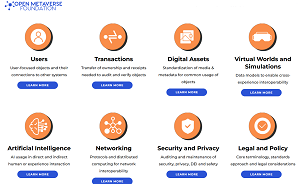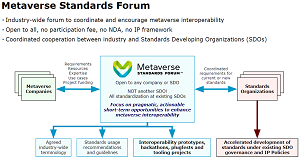News
New 'Open Metaverse Foundation' to Foster Open Source Software, Standards
Open source champion The Linux Foundation launched a new organization to help establish open source software and standards for the under-construction metaverse amid "deafening hype and fanfare."
The Open Metaverse Foundation (OMF) was announced on Jan. 18 with the mission of providing a collaboration space for diverse industries to work on developing a metaverse that is inclusive, global, vendor-neutral and scalable.
The foundation's launch comes with about a dozen members, including several Linux Foundation organizations, other foundations and private companies. Many specialize in different aspects of the OMFs efforts around artificial intelligence (AI), cloud/edge computing, digital assets, transactions, identity, networking, simulations, security and more.
Those areas somewhat align with eight "Foundational Interest Groups" that provide targeted resources and forums for the identification of new ideas, getting work done and onboarding new contributors:
- Users
- Transactions
- Digital Assets
- Simulations and Virtual Worlds
- Artificial Intelligence
- Networking
- Security and Privacy
- Legal and Policy
 [Click on image for larger view.] Open Metaverse Foundation Foundational Interest Groups (source: OMF).
[Click on image for larger view.] Open Metaverse Foundation Foundational Interest Groups (source: OMF).
The foundation's new web site includes this overview:
The potential for the open Metaverse is immense. It could be as impactful as the World Wide Web, but only if we pursue it together. At its best, it can be an ever-changing yet persistent, immersive experience that exists both between and inside of the digital and real worlds. For the Metaverse to truly flourish, it will need to be an open Metaverse for all.
We're still in the early days of what will become the Metaverse. It is an iterative puzzle where various pieces must come together and interoperate if we're to be successful. The Open Metaverse Foundation brings together thought-leading organizations and open source communities to work on developing open source software and standards for a global, vendor-neutral and scalable Metaverse.
Note that the OMF capitalizes the term "Metaverse," which is usually lowercase in press releases, media articles and so on. The group had this to say about that: "The all lower case version of the word metaverse is used in reference to technologies, standards, organizations and other terms when it is used a an adjective to describe the connection of the noun to the Metaverse (ie. metaverse ethics, metaverse computational capacity) as opposed to the stand-alone noun preceded by the word 'the', as in the Metaverse, which is a single construct similar to the use of the word 'Internet' and 'internet.'"
With that all cleared up, the group took to defining the "Metaverse" and explaining its origins:
Since the Metaverse is not yet a reality definitions differ greatly. Making it more complicated is the fact that the Metaverse is a concept that spans numerous industries which have varying definitions on what it should be.
The Metaverse is generally considered to be the 3D successor to the Internet. A single and universal immersive experience that can be experienced by any device and anywhere and consists of networked virtual worlds. Many say that VR headsets and AR devices are required to experience the Metaverse but it is most likely that it will be experienced on any 2D or 3D device. There is also an emphasis on social connections and the concept of a new digital virtual metaverse economy.
The word Metaverse is often preceded by 'the' and with an 'M' capitalized to denote the one and only Metaverse in-line with Neal Stephenson's original concept and writings.
The term "Metaverse" was originally coined in Neal Stephenson's 1992 science fiction novel "Snow Crash" and is a portmanteau of the words "meta" and "universe". It is generally understood that the word was a play on William Gibson's "cyberspace" as Snow Crash was a parody of novels and short stories that arose out of the cyberpunk movement.
Acknowledging the "deafening hype and fanfare" about the metaverse in a Jan. 18 blog post, the group's executive director, Royal O'Brien, said the new group will discuss, pinpoint and create the building blocks to transform the emerging concept into a reality spanning all those moving parts listed earlier.
"An open Metaverse offers rich experiences in many forms," O'Brien said. "It can create new jobs and industries in the digital space. It can bridge the gap between the physical and digital worlds while providing an amazing world where anyone can create their own opportunities. An open Metaverse broadens commerce for digital ownership and consumables, and it offers shared experiences and learning opportunities for anyone with access. The future market value for all of this may exceed any single media market."
It can also be "boring as ****" for most people, like the infamous Second Life, said one user on a Slashdot thread about the new project, where it was greeted with much skepticism. It's also discussed on Reddit (here and other threads) and is barely noticed on Hacker News.
The new initiative is not the first of its kind, either. Last summer the The Metaverse Standards Forum was announced with the mission to "explore where the lack of interoperability is holding back metaverse deployment and how the work of Standards Developing Organizations (SDOs) defining and evolving needed standards may be coordinated and accelerated."
 [Click on image for larger view.] Metaverse Standards Forum (source: Metaverse Standards Forum).
[Click on image for larger view.] Metaverse Standards Forum (source: Metaverse Standards Forum).
As detailed in the Virtualization & Cloud Review article, "Industry Heavyweights Form Metaverse Standards Forum," the membership of that organization is more weighted to the corporate side, with founding members including Meta, Microsoft, NVIDIA, Adobe, Alibaba, Qualcomm Technologies, Huawei, Sony Interactive Entertainment, Unity and many more.
Despite some negativity (and perhaps competition), O'Brien is participating with about 480 others on a Discord channel, where yesterday he provided more information in reply to someone who asked if the OMF was focusing more on discussing the standards or long-term planning for establishing software to build a metaverse with servers, clients and so on.
"Long term iterating to build open source software that leads to open standards," O'Brien replied. "It's focused on the modular blocks that developers can use as interoperable tools to build experiences (client, server, content and so forth)."
The channel also has many introductions from developers, software architects and others offering their services for the new project.
About the Author
David Ramel is an editor and writer at Converge 360.